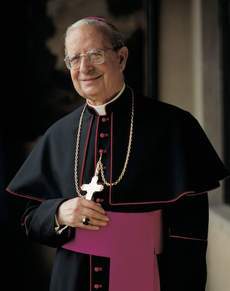Álvaro del Portillo
| Blessed Álvaro del Portillo |
|
|---|---|
| Prelate of Opus Dei | |

Álvaro del Portillo
|
|
| Native name | Álvaro del Portillo y Diez de Sollano |
| Church | Roman Catholic Church |
| In office | 1982—1994 |
| Predecessor | None; position established |
| Successor | Javier Echevarría Rodríguez |
| Other posts | Titular Bishop of Vita (1990-1994) |
| Orders | |
| Ordination | 25 June 1944 by Leopoldo Eijo y Garay |
| Consecration | 6 January 1991 by Pope John Paul II |
| Personal details | |
| Born |
11 March 1914 Madrid, Spain |
| Died | 23 March 1994 (aged 80) Rome, Italy |
| Buried | Church of Santa María de la Paz, Italy |
| Previous post | General President of Opus Dei (1975-1982) |
| Motto | Regnare Christum volumus ("We want Christ to Reign!") |
| Coat of arms |  |
| Sainthood | |
| Feast day | 12 May |
| Venerated in | Roman Catholic Church |
| Title as Saint | Blessed |
| Beatified | 27 September 2014 Madrid, Spain by Cardinal Angelo Amato |
| Attributes | Bishop's attire |
| Patronage |
|
Blessed Álvaro del Portillo - full name Álvaro del Portillo y Diez de Sollano - (11 March 1914 – 23 March 1994) was a Spanish engineer and Roman Catholic bishop. He served as the prelate of Opus Dei between 1982 and 1994 as the successor to Saint Josemaría Escrivá.
Luminaries such as Pope John Paul II and Cardinal Carlo Caffarra. have praised Portillo as a faithful servant of God. John Paul II referred to him as a "good and faithful servant" while Caffarra dubbed him a "disciple of Christ".
His cause of sainthood commenced on 21 January 2004 after being titled as a Servant of God. The confirmation of his heroic virtue on 28 June 2012 allowed for Pope Benedict XVI to name him as Venerable. He was beatified on 27 September 2014 in Madrid in a mass that Cardinal Angelo Amato presided over on the behalf of Pope Francis.
Alvaro del Portillo was born in Madrid on 11 March 1914. He was the third of eight children to the devout Ramón del Portillo Pardo and Clementina Diez de Solano Portillo; the couple had married on 11 January 1908. He was baptized on 17 March in the parish of Saint Joseph. He studied civil engineering and after obtaining his doctorate at the University of Madrid taught at its School of Engineering. He briefly worked with the Bureau of Highways and Bridges in the provinces crossed by the rivers Júcar, Duero and Ebro.
...
Wikipedia
